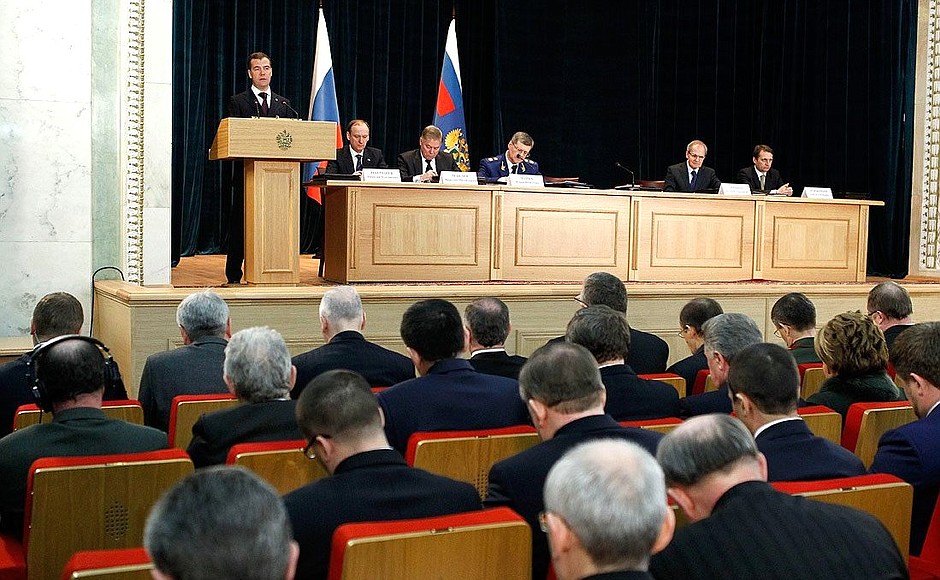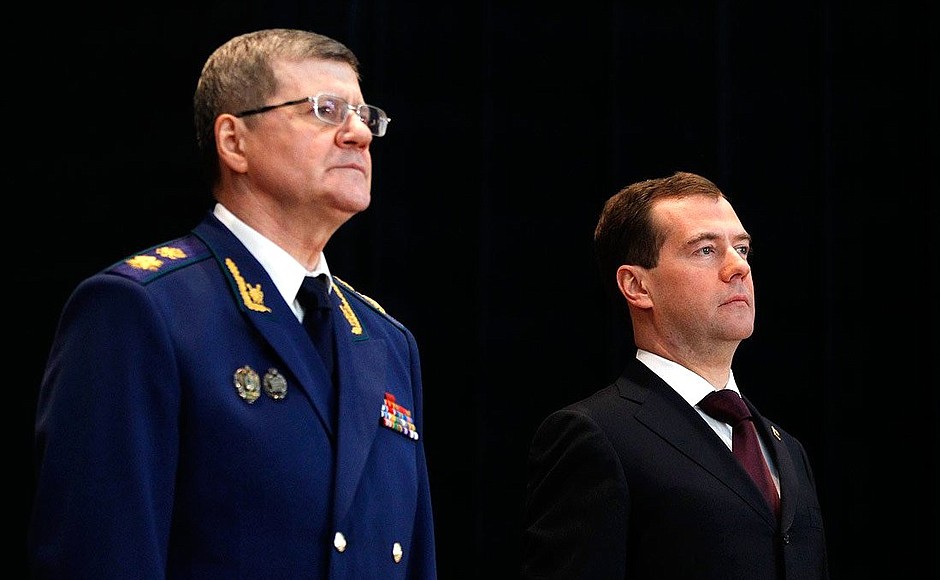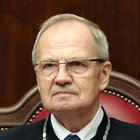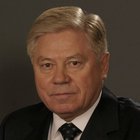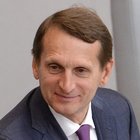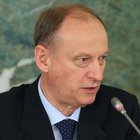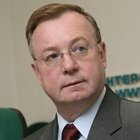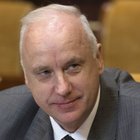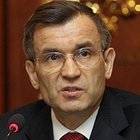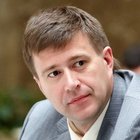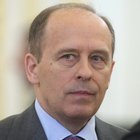Participants of the national coordination meeting included President of the Constitutional Court Valery Zorkin, President of the Supreme Court Vyacheslav Lebedev, Chief of Staff of the Presidential Executive Office Sergei Naryshkin, Secretary of the Security Council Nikolai Patrushev, Chairman of the Accounts Chamber Sergei Stepashin, Chairman of the Investigative Committee Alexander Bastrykin, Interior Minister Rashid Nurgaliyev, Justice Minister Alexander Konovalov, Director of the Federal Drug Control Service Viktor Ivanov, Director of the Federal Security Service Alexander Bortnikov, the Presidential Plenipotentiary Envoys to the Federal Districts, and regional governors.
* * *
President of Russia Dmitry Medvedev: Colleagues,
This is the first time we are meeting in this format that brings together the regional governors, representatives of all the branches of power, and representatives of the Prosecutor General’s Office and other law enforcement agencies. We are here to discuss crime fighting measures. I hope that today’s discussion will be as concrete and substantive, frank and engaged as possible. I expect too that the results that come out of it will improve the quality of law enforcement in our country and bolster our efforts to prevent and fight crime.
There have been serious changes recently in the law enforcement. We are reforming the Interior Ministry and strengthening the other law enforcement, military and security agencies. On January 15, I signed a federal law establishing the Investigative Committee, and on March 1, the law On the Police Force will come take effect. We have analysed law enforcement practices and adjusted the powers of a number of other state agencies accordingly, including the Prosecutor General’s Office, and we are improving the penitentiary system. All of these measures aim to give us a more modern and reliable law enforcement system, and one thus focused more on protecting our citizens from lawlessness and corruption.
I also want to take this opportunity to outline a number of priorities for your work.
The first is a task of paramount importance today: raising the level of antiterrorism security. I am referring to all aspects of antiterrorism protection, including the transport sector of course, given the shortcomings that came to light at Domodedovo Airport and other transport infrastructure sites such as railway stations.
I have already issued a number of instructions. The Interior, Transport, and Emergencies Ministries, as well as other agencies and also the economic actors involved, must carry out a coordinated antiterrorism policy, working together in overall coordination with the FSB as the organisation responsible for counterterrorism efforts in general. This must be real coordinated work, and not some token show of activity.
I remind the regional governors that all of the regions must carry out regular counterterrorism exercises, including in the transport sector. Such exercises should not be conducted only sporadically, only after tragedies, but regularly, as is the practice around the world. Yes, this can inconvenience passengers, and it does create a bit of tension, but it is nonetheless the only means of preventing these kinds of tragedies from happening in the first place.
”I remind the regional governors that all of the regions must carry out regular counterterrorism exercises, including in the transport sector. Such exercises should not be conducted only sporadically, only after tragedies, but regularly, as is the practice around the world.“
Areas for which various services have joint responsibility are the approaches to airports, railway stations, and metro stations and they should be placed under heightened supervision. Law enforcement representatives have said that we need to properly assign responsibilities over the adjoining areas and clearly identify who is responsible for what, so that we don’t end up with one police office patrolling the station square, and a completely different office supervising the station itself. This applies not just to the police, of course.
By the way, the Interior Ministry must raise police professional standards, and, as I have already said to the Minister, if need be, the number of police could be increased, including through transfers from other departments of the Interior Ministry, given the cutbacks that I have ordered. Whatever steps are required to ensure that transport and other public places are protected should be taken. Take the necessary decisions and report on them separately.
I remind you all again, above all the regional governors, that there must be regular inspections on an ongoing basis. We have the resources we need for this, and we have the regional antiterrorism commissions, and now the coordination meetings too, established in accordance with my instructions.
Furthermore, I have instructed the Prosecutor General to check on the executive authorities’ and relevant economic actors’ compliance with the current laws on neutralising security threats in the transport system. The authorities, economic actors, and business entities are responsible for the sites that they manage and operate, although we sometimes see the desire to slip out of this responsibility. Businesses should be open for dialogue, transparent, and not try to slip away from their duties.
Mr Chaika [Prosecutor General Yury Chaika], I am not sure if you have yet got to the bottom of who exactly owns Domodedovo Airport? The owner seems evident at first glance, but when you start to look into the details it turns out that the owner is hidden behind various beneficiary assets. And yet we are talking here about one of our biggest airports, which handles a huge number of planes, not to mention the tragedy that took place there. So, what is the situation? Do you have a report ready? You can brief us later.
Second, our crime-fighting work must produce better results. We should concentrate particularly on organised crime. There are cases well-known enough for me not to have to name them. We are to work consistently and resolutely to put a stop to the criminal groups active in the regions. There must be no protecting one’s own here: all such activity must be firmly suppressed.
I remind you again that at the end of last year, at the regional governors’ request, I decided to establish coordination meetings under the regional heads. By February 1, they drafted comprehensive plans for fighting crime and maintaining law and order. All of these plans must be absolutely realistic in nature. The most important thing now is to implement them. Of course you should support your local people, but you must not shelter them no matter what the circumstances and the cost.
Looking at a number of the headline-grabbing crimes that have taken place, I see that the local executive authorities’ logic often boils down to saying, “We did signal the matter, but nothing was done”. And the law enforcement agencies tell me the same thing at times. But if nothing is being done you are to pass the matter on upwards. The security and military organisations all have their superior officers, and the local officials can turn to the federal authorities. As I said then, you must record in the minutes of your meetings and discussions all issues that come up in your regions. Otherwise it is the regional governors who will have to answer.
”It is essential to do everything we can to keep minors from being drawn into the criminal world.“
Third, we must beef up crime prevention measures, including measures to prevent repeat offending, and add new provisions to the laws if need be. We still do not have any effective provisions for keeping watch over repeat offenders, and yet both our own and foreign experience shows that this kind of control does significantly reduce the risk of repeat offending.
The prevention work must focus particularly on minors of course, because over the last six years, the proportion of minors among offenders has increased 1.5 times, and one of the reasons for this is that they are left unsupervised, left without any parental or adult control. It is essential to do everything we can to keep minors from being drawn into the criminal world. We are to organise recreation activities for them, and introduce new practices for helping teenagers going through difficult circumstances. This is primarily the regional and local officials’ responsibility.
Fourth, people want to see positive changes in maintaining public law and order. In this respect we need more effective prevention of extremism. The number of people convicted of inciting interethnic hostility and taking part in extremist groups has increased almost 2.5 times over the last five years, and three quarters of the offenders are young people under 20. At the State Council Presidium meeting in Ufa, I gave the instruction to raise the quality of civic education in the country’s education system, and the state authorities, religious and public organisations must combine efforts in this work.
Fifth, countering corruption remains one of the key tasks for the Interior Ministry, Prosecutor General’s Office, Investigative Committee, and Federal Security Service. I have already given my assessment of the anti-corruption efforts carried out last year. This work must continue on a much broader scale. It is essential work, but you need to go about it consistently, carefully, and without making excessive waves.
”The laws are to be the same for everyone, and I think you realise this.“
By way of example, let me say a few words on the investigation that has begun into illegally organised gambling business in the Moscow Region. I want to say just one thing. The laws are to be the same for everyone, and I think you realise this. Those who break the laws must answer for their acts, no matter what their job, and no matter where they work: in the Prosecutor’s Office, Interior Ministry, FSB, or any other state agency. But under no circumstances can you make conclusions about someone’s guilt or innocence before the court has awarded its verdict (this is quite obvious), and all the more so, it is unacceptable to pressure the investigation by getting the media involved. People caught doing this will be fired, no matter what their rank or title. Investigations must be carried out in strict conformity with the law, in compliance with all supervisory procedures too of course, but calmly and smoothly, with their results then reported to the public. This is the way proper justice works. I hope you have all understood me.
One final thing: as has been said, the current reporting system does not give an accurate picture of the real crime situation. Starting on January 1, 2012, the Prosecutor General’s Office will take over responsibility for keeping the unified national statistics on all registered crimes and the number of crimes solved. I have already signed this law and hope to hear specific proposals from the Prosecutor General’s Office on this work’s organisation.
<…>
